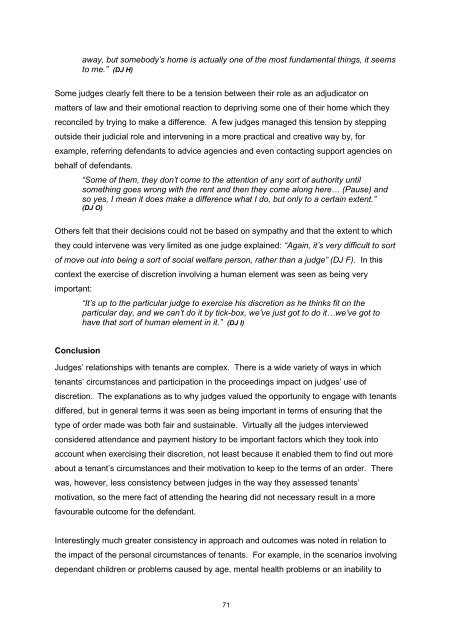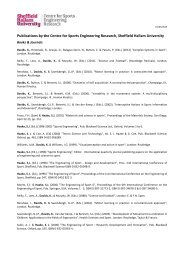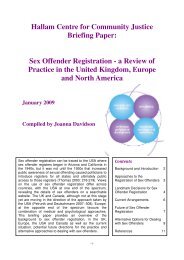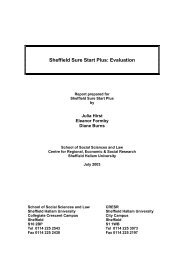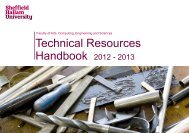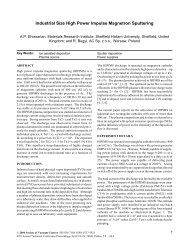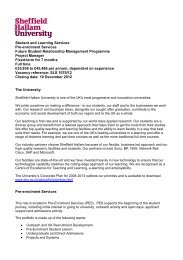The exercise of judicial discretion in rent arrears cases - Sheffield ...
The exercise of judicial discretion in rent arrears cases - Sheffield ...
The exercise of judicial discretion in rent arrears cases - Sheffield ...
Create successful ePaper yourself
Turn your PDF publications into a flip-book with our unique Google optimized e-Paper software.
away, but somebody’s home is actually one <strong>of</strong> the most fundamental th<strong>in</strong>gs, it seems<br />
to me.” (DJ H)<br />
Some judges clearly felt there to be a tension between their role as an adjudicator on<br />
matters <strong>of</strong> law and their emotional reaction to depriv<strong>in</strong>g some one <strong>of</strong> their home which they<br />
reconciled by try<strong>in</strong>g to make a difference. A few judges managed this tension by stepp<strong>in</strong>g<br />
outside their <strong>judicial</strong> role and <strong>in</strong>terven<strong>in</strong>g <strong>in</strong> a more practical and creative way by, for<br />
example, referr<strong>in</strong>g defendants to advice agencies and even contact<strong>in</strong>g support agencies on<br />
behalf <strong>of</strong> defendants.<br />
“Some <strong>of</strong> them, they don’t come to the attention <strong>of</strong> any sort <strong>of</strong> authority until<br />
someth<strong>in</strong>g goes wrong with the <strong>rent</strong> and then they come along here… (Pause) and<br />
so yes, I mean it does make a difference what I do, but only to a certa<strong>in</strong> extent.”<br />
(DJ O)<br />
Others felt that their decisions could not be based on sympathy and that the extent to which<br />
they could <strong>in</strong>tervene was very limited as one judge expla<strong>in</strong>ed: “Aga<strong>in</strong>, it’s very difficult to sort<br />
<strong>of</strong> move out <strong>in</strong>to be<strong>in</strong>g a sort <strong>of</strong> social welfare person, rather than a judge” (DJ F). In this<br />
context the <strong>exercise</strong> <strong>of</strong> <strong>discretion</strong> <strong>in</strong>volv<strong>in</strong>g a human element was seen as be<strong>in</strong>g very<br />
important:<br />
Conclusion<br />
“It’s up to the particular judge to <strong>exercise</strong> his <strong>discretion</strong> as he th<strong>in</strong>ks fit on the<br />
particular day, and we can’t do it by tick-box, we’ve just got to do it…we’ve got to<br />
have that sort <strong>of</strong> human element <strong>in</strong> it.” (DJ I)<br />
Judges’ relationships with tenants are complex. <strong>The</strong>re is a wide variety <strong>of</strong> ways <strong>in</strong> which<br />
tenants’ circumstances and participation <strong>in</strong> the proceed<strong>in</strong>gs impact on judges’ use <strong>of</strong><br />
<strong>discretion</strong>. <strong>The</strong> explanations as to why judges valued the opportunity to engage with tenants<br />
differed, but <strong>in</strong> general terms it was seen as be<strong>in</strong>g important <strong>in</strong> terms <strong>of</strong> ensur<strong>in</strong>g that the<br />
type <strong>of</strong> order made was both fair and susta<strong>in</strong>able. Virtually all the judges <strong>in</strong>terviewed<br />
considered attendance and payment history to be important factors which they took <strong>in</strong>to<br />
account when exercis<strong>in</strong>g their <strong>discretion</strong>, not least because it enabled them to f<strong>in</strong>d out more<br />
about a tenant’s circumstances and their motivation to keep to the terms <strong>of</strong> an order. <strong>The</strong>re<br />
was, however, less consistency between judges <strong>in</strong> the way they assessed tenants’<br />
motivation, so the mere fact <strong>of</strong> attend<strong>in</strong>g the hear<strong>in</strong>g did not necessary result <strong>in</strong> a more<br />
favourable outcome for the defendant.<br />
Interest<strong>in</strong>gly much greater consistency <strong>in</strong> approach and outcomes was noted <strong>in</strong> relation to<br />
the impact <strong>of</strong> the personal circumstances <strong>of</strong> tenants. For example, <strong>in</strong> the scenarios <strong>in</strong>volv<strong>in</strong>g<br />
dependant children or problems caused by age, mental health problems or an <strong>in</strong>ability to<br />
71


